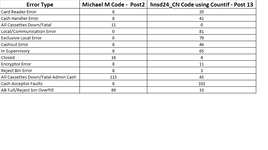buvanamali
New Member
- Joined
- Jul 27, 2014
- Messages
- 42
Hi
The following are the errors spread across the several columns from E to Q ie. 13 columns across several sheets with more than 500 rows per sheet.
I am in search of a macro to count the no of instances of the following errors in each column and the number of counts result at the end of last row of respective column of each sheet.
My data starts at from 2nd row, 1st row being the header on each sheet. The number of rows per sheet will vary. Can anyone help me in resolving this issue.
Thanks in Advance.
1) Card Reader Error
2) Cash Handler Error
3) All Cassettes Down/Fatal
4) Local/Communication Error
5) Exclusive Local Error
6) Cashout Error
7) In Supervisory
8) Closed
9) Encryptor Error
10) Reject Bin Error
11) All Cassettes Down/Fatal Admin Cash
12) Cash Acceptor Faults
13) AB Full/Reject bin Overfill
Buvanamali
The following are the errors spread across the several columns from E to Q ie. 13 columns across several sheets with more than 500 rows per sheet.
I am in search of a macro to count the no of instances of the following errors in each column and the number of counts result at the end of last row of respective column of each sheet.
My data starts at from 2nd row, 1st row being the header on each sheet. The number of rows per sheet will vary. Can anyone help me in resolving this issue.
Thanks in Advance.
1) Card Reader Error
2) Cash Handler Error
3) All Cassettes Down/Fatal
4) Local/Communication Error
5) Exclusive Local Error
6) Cashout Error
7) In Supervisory
8) Closed
9) Encryptor Error
10) Reject Bin Error
11) All Cassettes Down/Fatal Admin Cash
12) Cash Acceptor Faults
13) AB Full/Reject bin Overfill
Buvanamali






